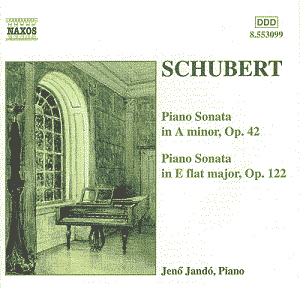Jando’s ongoing Schubert series for Naxos has generally
had a rather lukewarm critical reception. The Penguin Guide found his
disc of the great final B flat Sonata (No. 21) to be,"…carefully
thought out but ultimately unrewarding […] he rarely conveys its tenderness
or sublimity, and the listener remains untouched" Of course the
main problem for Jando, and indeed for any other pianist working their
way through these masterpieces, is that the greatest Schubertians of
both past and present generations have recorded these works. He is quite
simply up against the best, and a cursory glance through the catalogue
shows versions of all the mature sonatas from Schnabel, Curzon, Kempff,
Brendel, Uchida, Schiff, Ashkenazy, Lupu etc. The list goes on, and
a newcomer has to have something very special to say to dislodge memories
of artists of this calibre.
It is to Jando’s credit that when one is playing this
new disc, it is very easy to enjoy on its own terms, and I doubt if
any casual buyer wanting to cheaply investigate new areas of the repertoire
will be disappointed. He despatches the great A Minor Sonata with technical
assurance and a feeling for the architecture of the phrases. The long
first movement benefits from his particularly ‘no-nonsense’ approach,
and as with many of his other recordings, Jando seems resolutely determined
to let the notes speak for themselves. But turn to the competition and
you may begin to feel short-changed. I happened to have just listened
to (and recorded) a Brendel recital from Birmingham’s Symphony Hall
that finished with this sonata, and the comparison was illuminating.
Brendel’s handling of the haunting opening phrase is just a shade more
relaxed, even introverted, and this means that when the screws are tightened
(at around 7’ 24") the listener feels the tension inexorably mount.
Climaxes are suitably weighty, but there feels to be a greater sense
of light and shade, of give and take, that make Schubert’s ‘heavenly
lengths’ more satisfying. The poetic sensibility that is at the heart
of the piece suddenly feels slightly rode over by Jando, and although
I would sooner experience his straightforwardness than someone distorting
or pulling things out of shape, there is no doubting the experience
and intellect of Brendel or Uchida is ultimately more satisfying for
repeated listening. I like Jando’s way with the syncopations of the
third movement scherzo, but even here there is a touch of aggressiveness
when compared to Brendel, who also allows more breathing space and contrast
for the trio section to emerge (around 3’ 53").
The earlier, more Beethoven influenced, E flat Sonata
(published posthumously in 1829) shows basically the same approach,
though the more playful, outgoing nature of the material suits Jando’s
temperament slightly more than the later work. Some listeners may again
find his tone a shade over-forceful in places (in the Andante 2nd
movement, for instance), but it never gets the better of him. The finale
is more Allegro than moderato, but in this case it points up the Beethoven
connection quite clearly and appropriately.
The recorded sound is good, with a well-balanced tonal
picture, and the microphone placing is not too close. Jando’s instrument
has the odd tuning problem in the upper register in D.845, though seems
better in the E flat (maybe due to the attentions of a tuner?).
All-in-all, an issue that will not displace any Schubertian's
favourites, and does not plumb the depths as much as it might, though
there are no serious reasons for the average collector not to investigate.
Tony Haywood


